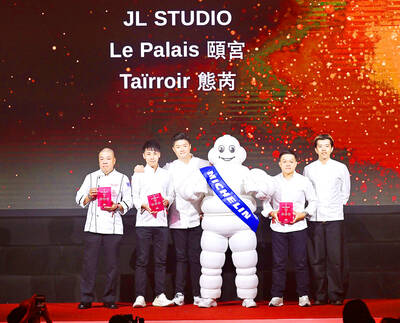Habits may destroy your health. A health examination institution recently published a list of bad habits with lack of exercise topping the list. It was also noted that while many people are in the habit of sitting with their legs crossed or getting out of bed as soon as they wake up, doctors say that they can lead to scoliosis and postural hypotension, respectively.
The report was compiled from a study of 18,000 people, one of whom was the super marathon runner Kevin Lin, who is the manager of the Xinyi branch of the institution. The report found that 65.6 percent of the participants exercised less than three times a week, and always less than half an hour. Lin said that even those who exercise habitually may not understand their body and do the wrong kind of exercises. For example, middle-aged people with high blood pressure could power walk, but they should not play basketball.
Second and third on the list of bad habits were using the computer for more than three hours consecutively, and getting out of bed as soon as one wakes up. Doctor Song Pi-kun explained that getting out of bed too quickly could cause postural hypotension and dizziness in elderly people or patients with cardiovascular disease, causing them to fall. Staying in bed a few minutes after waking up is not a sign of laziness and could instead be good for your health.
Fourth place on the list went to crossing one’s legs. Song said this could impede blood circulation in the legs and cause venous thrombosis, scoliosis, or a slipped disk.
In terms of food and drink, bad habits include eating hot food or having a daily intake of 300mg of caffeine. Song said that hot food could damage the mucous membrane and cause acute esophageal reflux or gastritis. An excessive intake of caffeine could also lead to osteoporosis, sleep problems and cardiovascular disease.
Toilet habits are also important. Reading on the toilet or squeezing too hard if one is constipated is not good. Song said that sitting on the toilet too long can result in hemorrhoids, while squeezing too much can lead to high blood pressure and result in cerebral hemorrhage.
Song recommended avoiding eating food that is hotter than 40°C and drinking more than two cups of coffee or tea per day and to develop the habit of going to the toilet every day, and drinking a glass of water in the morning to stimulate the bowls. He also warned against bringing a book to the toilet and said we should try to develop a habit of exercising.
(Liberty Times, translated by Perry Svensson)
習以為常的生活習慣可能是健康殺手。一家健檢機構昨天公布錯誤生活習慣排行榜,缺乏運動高居榜首。值得注意的是,翹二郎腿、睡醒立刻下床是許多人的小習慣,但醫師提醒,上述習慣可能分別導致脊椎側彎及姿勢性低血壓。
此項調查由健檢機構針對一萬八千餘名會員進行調查,超級馬拉松好手林義傑以該家機構信義會館總經理的身分出席。調查發現,六十五.六%受訪者運動量未達每週三次,每次三十分鐘。林義傑提醒,即使有運動習慣,也可能不了解身體狀況,做錯運動,例如高血壓中年人適合健走,不適合打籃球。
錯誤習慣第二、三名分別是連續使用電腦三小時以上,剛睡醒就立即下床。醫師宋丕錕解釋,睡醒立刻下床,易使心血管疾病患者、銀髮族出現姿勢性低血壓、眩暈,易跌倒,適度賴床三分鐘,不是睡懶覺,反而有益健康。
第四名為翹二郎腿,宋丕錕表示,翹二郎腿會使腿部血流不順,造成靜脈血栓,也易導致脊椎側彎、椎間盤突出。
飲食部分,喜歡吃燙食及每天咖啡因攝取超過三百毫克,也都算壞習慣。宋丕錕指出,燙食易損傷黏膜,導致急性食道炎與急性胃炎,咖啡因攝取過量也會造成骨質疏鬆、睡眠障礙、心血管疾病。
如廁習慣也很重要,如廁閱讀,便秘時過於用力排便都不適合。宋丕錕提醒,在馬桶坐太久,反因直腸靜脈曲張瘀血,讓痔瘡更嚴重;排便時過度用力,易使血壓升高,引發腦溢血。
宋丕錕建議,避免長期食用四十度C以上高溫食物,咖啡或茶一天不超過兩杯,養成每天如廁習慣,早上一杯水,刺激腸胃蠕動,最好不要帶書進廁所,並養成運動的習慣。
(自由時報記者林相美)

If you think you’re cool and know all the latest trends, then here’s a question for you: What does the word “brat” mean? If you said something like, “a child who behaves badly or is annoying or rude,” you might not be as hip as you think. This four-letter word now has a new definition that has become quite popular. Its popularity caught the eye of Collins Dictionary, which crowned it as “Word of the Year 2024.” According to this new meaning of brat, it is used as an adjective to describe someone who has a confident, independent, and hedonistic

A: Seeing as the 2025 Michelin Guide extended to New Taipei City and Hsinchu City and County, it’s hard to believe that none of the restaurants won a Michelin star. B: Some fine establishments — like Hsinchu’s A Cut steakhouse — surely deserve the honor. A: Michelin-starred restaurants have good quality food, but some of them are so pricey. B: I once had barbeque pork at a starred restaurant that set me back NT$4,800. That’s even higher than my weekly food budget. A: No wonder several of them have closed down recently, as high prices and the tariff war are scaring off

★ Bilingual Story is a fictionalized account. 雙語故事部分內容純屬虛構。 “Get in. It’s pouring.” She slid into the back seat, drenched and silent. “Tissues?” the driver asked. “No, thank you,” she said. Water beaded off her hair, ran from her coat, and made a small lake on the vinyl. She kept her head down, long black strands clinging to her face. “Where to?” She gave an address. “Funeral?” he asked as they slipped into the Xinhai Tunnel, rain fading to a hollow drum. She glanced up, puzzled. “No. Why?” “Crematorium’s about the only thing here.” He caught her eyes in the mirror.

Continued from yesterday(延續自昨日) https://www.taipeitimes.com/News/lang Interestingly, one of the words Collins Dictionary discarded was selected by Oxford University Press (OUP) for its own Word of the Year. On its Web site, the publishing house of the University of Oxford stated it had conducted a public poll in which over 37,000 people participated. The voters, along with OUP’s language experts, settled on the term “brain rot.” One main reason for the decision was the vast amount of interest in the noun during 2023 and 2024, with its usage increasing by 230 percent. In fact, brain rot is not a new term by any